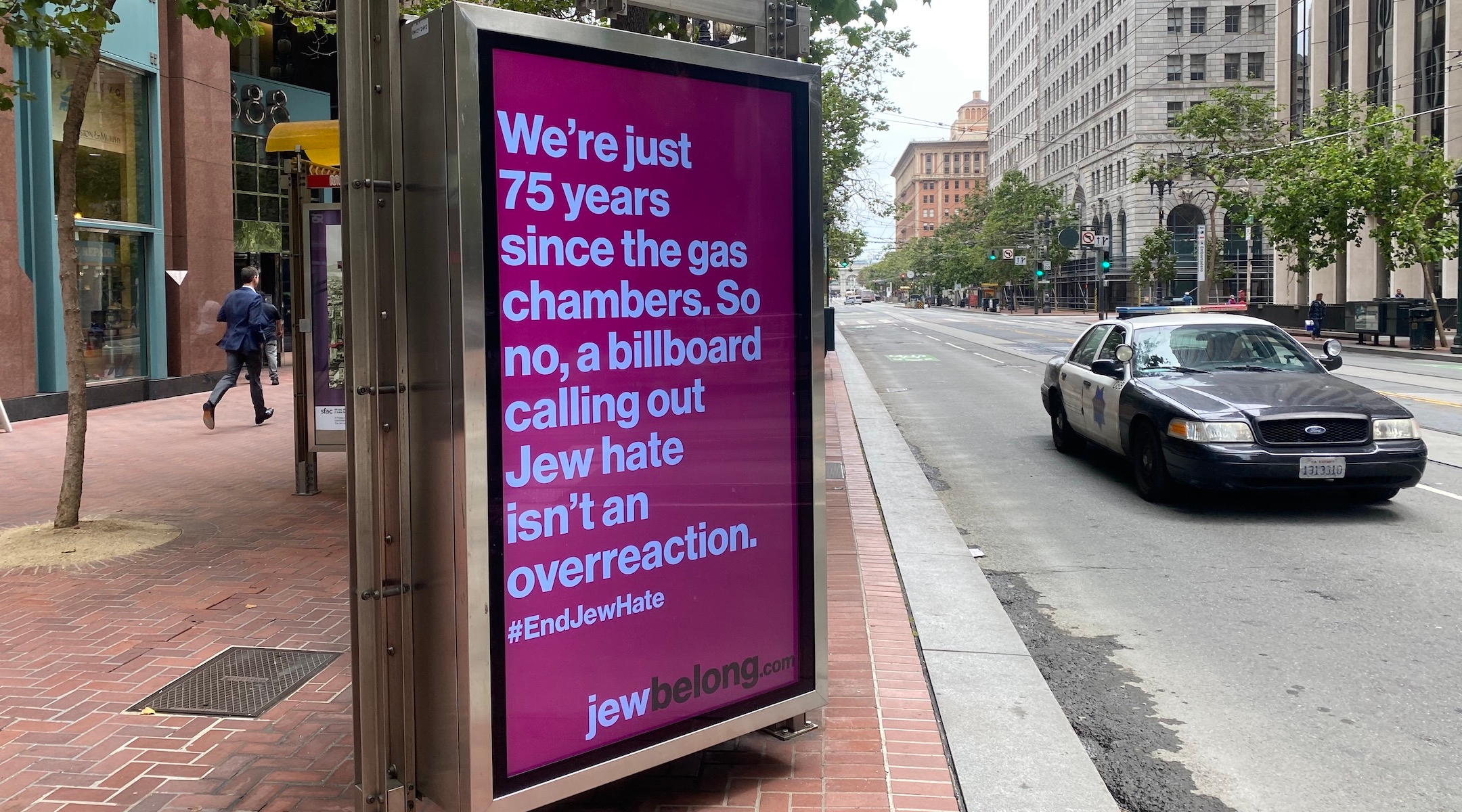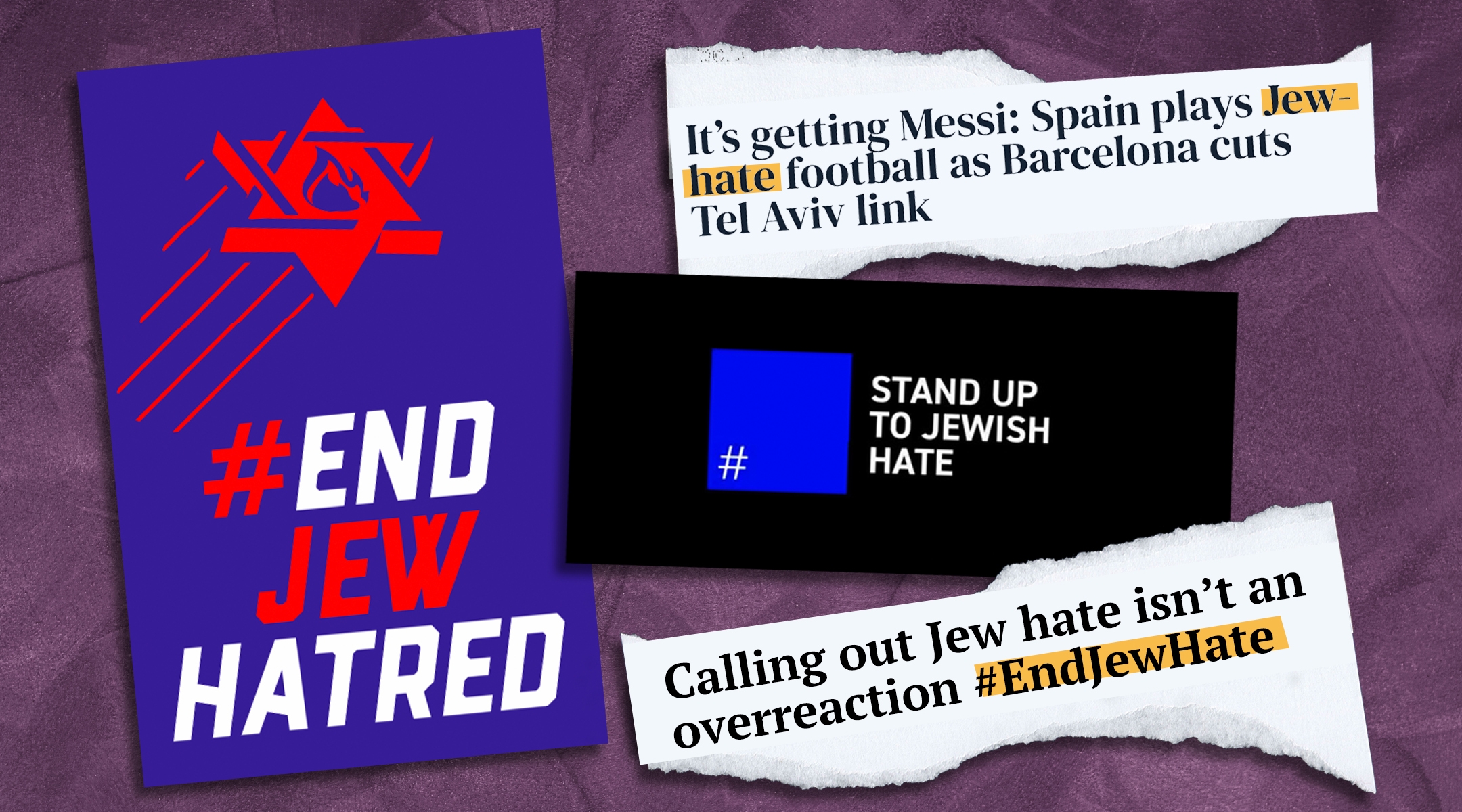(JTA) — I read a lot about antisemitism — as a professor researching prejudice, as a former fellow at a Holocaust memorial center, as a blogger for The Times of Israel, as the son of a Jewish father who was so grateful to get to live in the United States and as the father of a Jewish son in that same country, but with antisemitism on the rise.
I’ve noticed a shift in what I’m reading. The media, especially social media, are increasingly replacing the term “antisemitism” with a new term: “Jew hate.”
“Simply put, antisemitism is Jew hate,” Richard Lovett, co-chairman of Creative Artists Agency, the world’s leading entertainment and talent agency and a marketing and branding powerhouse, remarked last month in an address encouraging his industry to fight antisemitism. Also last month, the governor and attorney general of Massachusetts, the mayor of Boston and other state leaders launched a campaign to “#StandUpToJewishHate,” an effort bankrolled by New England Patriots owner Robert Kraft.
Brooke Goldstein, the founder of the pro-Israel Lawfare Project and author of the book “End Jew Hatred,” has started an organization with the same name. The nonprofit JewBelong launched the #EndJewHate billboard campaign in 2021 in cities around the country.
London’s Jewish Chronicle — the oldest continuously published Jewish newspaper in the world — has now run several articles using “Jew hate” in addition to or instead of “antisemitism.”
I have asked colleagues who work on Holocaust remembrance, fighting antisemitism and promoting tolerance why they now prefer “Jew hate” to “antisemitism.” They consider it strong and clever branding, jarring and unapologetic, and I can’t argue with that. The phrase packs a punch. And it aligns Jewish groups with a larger social phenomenon: the various efforts to study and stop the menacing resurgence of hate groups. There are new university centers for the study of hate, new hate-focused conferences and several journals dedicated to hate studies. Hate is hot. Branding antisemitism as “Jew hate,” it is hoped, will help to mainstream concern about antisemitism.
The popularity of “Jew hate” coincides with concerns about the term “antisemitism.” Once usually spelled “anti-Semitism,” the term is increasingly spelled without the hyphen and with a lowercase first “s.” This change was made out of concern that the former spelling reinforced the pseudo-scientific, long-discredited idea that Jews are members of the “Semitic” race.
Nevertheless, adopting “Jew hate” in place of “antisemitism” is a big mistake. It misses way too much.

A JewBelong bus ad in downtown San Francisco, part of a nationwide campaign to raise awareness of antisemitism. (Gabriel Greschler/J. Jewish News of Northern California)
The term “antisemitism” — like the reality it describes — encompasses not only hate, but also fear and envy. People can fear or envy Jews without hating them. True, these biases can lead to stereotypes about Jews and the negative consequences of those stereotypes. People with preconceived notions about Jews are likely to notice and remember selectively or simply hear and believe whatever supports their biases while disregarding, disbelieving or downplaying information to the contrary. One Jewish head of a major newspaper or movie studio, according to this thinking, shows that Jews control the media. In this way, antisemitism can be self-perpetuating even when not powered by outright hatred.
“Jew hate” does not take into account apathy, the lack of concern that throughout history has allowed the actual haters to get away with much more than they would have otherwise. Nor does “Jew hate” take into account a dangerous kind of admiration. Well-meaning people may have positive stereotypes about Jews being intelligent and good in certain professions. These biases are not hateful, but they do reduce Jews to stereotypes.
“Jew hate” does not adequately capture antisemitism born of ignorance — not only of Jewish history and culture but also of the history and effects of antisemitism. Ignorance about Jewish culture, history and traditions can contribute to discrimination against Jews, thus perpetuating antisemitism even when there is no hate. The rising and amazing ignorance of the facts of the Holocaust, for example, sets the stage for more people to dismiss or downplay its severity. That, in turn, will breed resentment — or worse — toward Jews, who are increasingly being cast as obnoxious and self-pitying for insisting that the Shoah happened and seeking to remind the world how bad it was.
If it irritates people when a Jew doesn’t care to join them in singing Christmas carols or to buy the annual Christmas stamp, that’s not necessarily hatred. It’s probably just ignorance of what it means to be in the minority versus the majority. Nevertheless, such ignorance, like ignorance of the Holocaust, can have an antisemitic effect.
Most alarming, the concept of “Jew hate” undermines the fight against antisemitism by — and this was supposed to be a point in its favor — making antisemitism just one instance of a broader category: hate. It should go without saying that one should be against most forms of hate. “Hate has no home here” lawn signs are admirable. But there are essential differences between each form of hate. They are not simply flavors to be served up when the media or a corporation wants to take a popular position. Diseases of the society, like diseases of the body, need to be understood and combatted on their own specific terms. Antisemitism has its own distinct history and pathology. The fight against antisemitism is not just the fight against white supremacy or misogyny or Islamophobia with a different name on the tee shirt.
Ultimately, what worries me most is that the concept of “Jew hate” lets people off too easily. Most people aren’t going to defend hatred, but having disavowed hatred, there’s still a lot to answer for. Antisemitism is real and there seems to be no end in sight. The digital age has amplified the speed and spread of anti-Jewish tropes, extremist ideologies and antisemitic conspiracy theories.
Metal detectors and armed guards are now common at major Jewish gatherings. That’s a sign of real sickness in the culture, but rebranding antisemitism to fit more neatly into the “fight hate” agenda isn’t the cure.
JTA has documented Jewish history in real-time for over a century. Keep our journalism strong by joining us in supporting independent, award-winning reporting.







